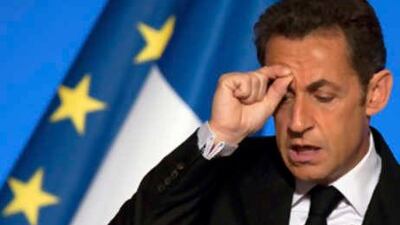The leaders of Europe's four largest economic powers are to hold crisis talks on the global financial meltdown today in Paris, despite disputes that killed off talk of a joint bailout package. As the US president, George W Bush, signed off on a US$700 billion (Dh2.5 trillion) handout to Wall Street, the financial world's eyes turned to Europe in the hope of further generous measures to free up capital and reassure jumpy markets.
But if European bankers were hoping for a similar emergency fund to underwrite institutions exposed to bad credit, they were destined to be disappointed by the leaders of Britain, France, Germany and Italy. French politicians had privately floated such an idea during the week, and the Dutch government talked in terms of more than ?300bn euros (Dh1.5 trillion) being set aside by European governments.
Germany and Britain shot this down quickly, however, and the Paris talks are now expected to concentrate on improving the co-ordination between European powers on financial bailouts and on reform to accountancy rules. In fact, the German chancellor, Angela Merkel, and British prime minister, Gordon Brown, only confirmed they would attend Saturday's talks after France quietly backed away from a joint fund.
The German economy minister, Michael Glos, warned "very well paid" bankers that they must put their own houses in order and not hope for a government bailout. His colleague, finance minister Peer Steinbruck, was also scathing. "It's already quite enough that German taxpayers have to pay for the antics of banks which set up in Dublin in order to escape German taxes," he said, in reference to a subsidiary of a German bank that was bailed out last week.
Steinbruck's French counterpart Christine Lagarde ? who earlier in the week had floated the idea of a bailout fund ? said today that she simply hoped the summit would lead to "much more co-operation" between capitals. Lagarde welcomed the US bailout, calling it: "Good news for the confidence and the operation of banks, financial institutions and markets". Before leaving London, Mr Brown said he would call on his colleagues to release earlier than planned a previously announced ?15bn (Dh76bn) European fund to help provide small business loans.
France still sees the summit as an opportunity to push for more state regulation in place of the Anglo-American laissez-faire approach of recent years that many blame for allowing the crisis to develop. Ahead of the summit, Mr Sarkozy met with a potential ally, the French head of the International Monetary Fund, Dominique Strauss-Kahn. "In Europe there is a need for co-ordination," Mr Strauss-Kahn told journalists after his meeting. "It has to be indicated to the markets ... that European countries will not react as every man for himself."
"In the eurozone we haven't yet undergone trial by fire. This, this is a trial by fire. Europe, and in particular the eurozone, needs to show it is capable of responding in a crisis," he said. Last week, when the trans-Atlantic financial storm made landfall in Europe and it became clear some banks were in trouble, Mr Sarkozy urged the G8 powers "to establish the basis of a new international financial system". The four leaders were due to gather in Paris in the afternoon and hold two hours of talks at the Elysee Palace from 2.30pm (GMT), followed by a working dinner. A press conference was planned for later in the evening. Mr Sarkozy, Mr Brown, Mrs Merkel and the Italian prime minister, Silvio Berlusconi, lead the European members of the G8 group of nations, sometimes known as the G4. They are to be joined by the chairman of European Commission Jose Manuel Barroso, Jean-Claude Juncker, who chairs the eurozone single-currency group and Jean-Claude Trichet, the president of the European Central Bank (ECB). * AFP

